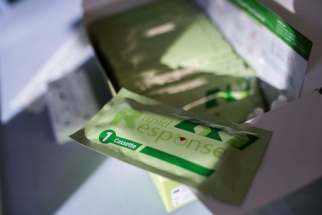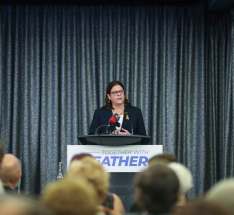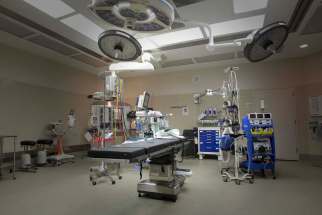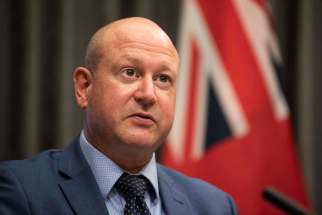158 health-care workers on unpaid leave in Manitoba
Read this article for free:
or
Already have an account? Log in here »
To continue reading, please subscribe:
Monthly Digital Subscription
$0 for the first 4 weeks*
- Enjoy unlimited reading on winnipegfreepress.com
- Read the E-Edition, our digital replica newspaper
- Access News Break, our award-winning app
- Play interactive puzzles
*No charge for 4 weeks then price increases to the regular rate of $19.00 plus GST every four weeks. Offer available to new and qualified returning subscribers only. Cancel any time.
Monthly Digital Subscription
$4.75/week*
- Enjoy unlimited reading on winnipegfreepress.com
- Read the E-Edition, our digital replica newspaper
- Access News Break, our award-winning app
- Play interactive puzzles
*Billed as $19 plus GST every four weeks. Cancel any time.
To continue reading, please subscribe:
Add Free Press access to your Brandon Sun subscription for only an additional
$1 for the first 4 weeks*
*Your next subscription payment will increase by $1.00 and you will be charged $16.99 plus GST for four weeks. After four weeks, your payment will increase to $23.99 plus GST every four weeks.
Read unlimited articles for free today:
or
Already have an account? Log in here »
Hey there, time traveller!
This article was published 20/10/2021 (1511 days ago), so information in it may no longer be current.
The number of front-line health-care workers who are on unpaid leave because they refuse to provide proof of vaccination or take a COVID-19 test has grown to 158 — more than half of whom work in the Southern Health region.
Management has had to redeploy staff from other programs in the region to Eastview Place in Altona and Salem Home in Winkler “to ensure ongoing quality care and services,” a Shared Health spokesman said Wednesday.
Vaccine status
More than 37,000 of Manitoba’s 42,000 direct-care workers have completed the voluntary online disclosure process.
Just over 35,000 have indicated they have been fully vaccinated. That’s approximately 95 per cent of those whose online disclosure has been completed.
A large number of paper forms have been collected at sites and by managers and are still being manually entered into the system. Managers remain responsible for confirming the vaccination status of direct-care workers when they show up for work. Those who are not confirmed are required to undergo testing.
As of Tuesday evening, 1,866 health-care workers had been identified as requiring testing.
— Source: Shared Health
“Designated family caregivers are continuing to visit and provide some support with feeding and visiting at some sites,” he said in an email.
Last week, Salem Home in Winkler and Tabor Home in Morden sent letters to residents’ families advising them there may be staffing shortages on Monday when vaccination or COVID-19 testing became a requirement for direct-support workers, and that they could be asked to help care for their loved ones.
The system has been able to deal with the absences, a Shared Health spokesman said Wednesday.
“Contingency plans have been, and continue to be, in place and the staffing impacts continue to be very closely monitored.”
Additional resources, including the COVID-19 casual pool of workers and internationally educated nurses have volunteered to provide staffing support and are being added to work schedules, he said.
Of 42,000 Manitoba health-care workers, 158 are on unpaid leave for refusing to comply with the public health orders that took effect Monday. They work in a variety of professions.
Most are in rural Manitoba, Shared Health data show. Just 17 are employed by the Winnipeg Regional Health Authority and three work for Shared Health, while 138 are outside the city: 83 in Southern Health, 27 in Interlake-Eastern, 26 in Prairie Mountain and two in the Northern region.
Shared Health said the “vast majority” of health-care facilities are reporting no “significant” impacts related to the employees being off work.
Southern Health, however, did not make a representative available for an interview Wednesday. Citing privacy concerns and human resource issues, the health authority stated it couldn’t disclose where the 83 staff on leave work or which health-care facilities had to bring in more staff through redeployments.
“Regarding service delivery, contingency plans are in place to ensure ongoing access to health services and we are happy to report that, to date, those areas are operating with appropriate staffing levels, ensuring the ongoing care and comfort of our most vulnerable citizens,” a spokesperson wrote in an emailed statement.
Coming off a stint in intensive care this week, a Winkler physician said he was expecting some aides and support staff to go on leave as a result of the mandatory vaccination or testing policies, but so far the effect on the hospital hasn’t been as bad as he had feared.
“We were expecting health-care aides and other support staff to fall into this group of 83 that you describe; I do believe that the personal care homes are more severely affected.” – Dr. Ganesan Abbu
“In this area, it’s not unexpected. We kind of anticipated that, hoped that would not be the case,” said Dr. Ganesan Abbu, who is based at Boundary Trails Health Centre.
“We were expecting health-care aides and other support staff to fall into this group of 83 that you describe; I do believe that the personal care homes are more severely affected.”
Abbu said he was told the hospital braced for protests earlier this week when staff became subject to mandatory testing and checking of vaccination status, but that only three people showed up to protest and quickly disbanded, on Monday.
Shared Health issued a reminder to members of the public and those on an unpaid leave of absence not to disrupt or block people who enter and leave facilities and to stay off health authority and health-care facility property so as not to disrupt health-care workers’ “sense of security.”
“Health-care workers, designated family caregivers and visitors must continue to have unimpeded access to facilities, including access to parking for their use,” Shared Health stated.
“So far, it hasn’t been as bad as we’ve anticipated, but I think the next week or two will tell the real story.” – Dr. Ganesan Abbu
Meanwhile, Abbu said he is still working to care for severely ill patients. The number of COVID-19 patients at Boundary Trails hasn’t spiked after Thanksgiving, but health officials are anticipating higher numbers of infections over the next couple of weeks.
“So far, it hasn’t been as bad as we’ve anticipated, but I think the next week or two will tell the real story,” Abbu said.
Only one of the seriously ill patients he treated this week had COVID-19, but that doesn’t mean the virus is less of a concern in the area. COVID-19 patients who are seriously ill are being transported to Winnipeg or staying on hospital wards for palliative care, he said.
“The trend right now, though, is when patients come, they either come in very sick and they need to be intubated and sent to Winnipeg right away, so that’s one reason why our numbers have been lower than the third wave. The second reason is that a lot of patients, especially elderly patients, those with co-morbidities, when they come in, then we’ve had a few more deaths than we had in the third wave… more patients kind of elect to be palliative.”
No health-care staff at CancerCare Manitoba refused to get vaccinated or tested, Shared Health said.
carol.sanders@freepress.mb.ca
katie.may@freepress.mb.ca


Katie May is a general-assignment reporter for the Free Press.
Our newsroom depends on a growing audience of readers to power our journalism. If you are not a paid reader, please consider becoming a subscriber.
Our newsroom depends on its audience of readers to power our journalism. Thank you for your support.








